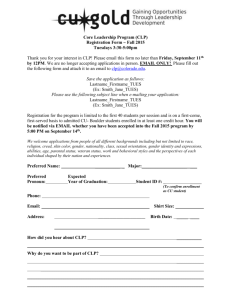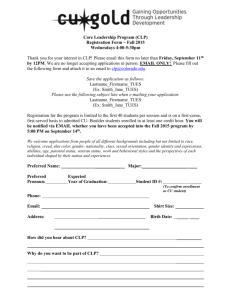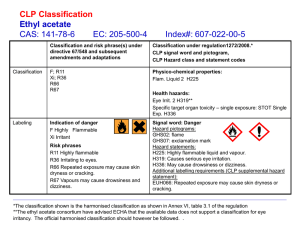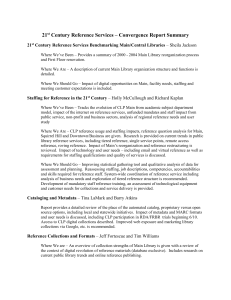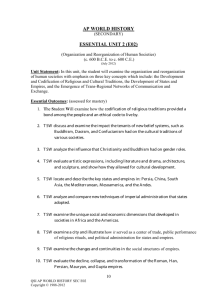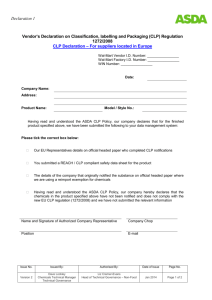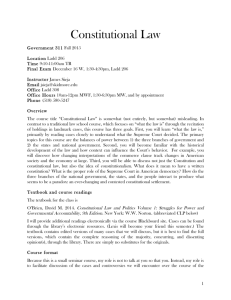Learning and teaching aspects of inquiry
advertisement
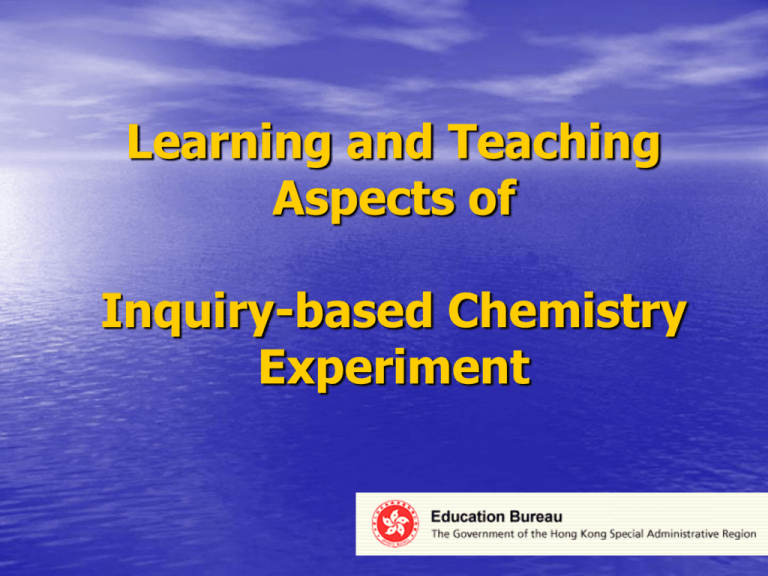
Learning and Teaching Aspects of Inquiry-based Chemistry Experiment What is chemistry? How to help students learn chemistry? Why chemistry is difficult to learn? • Matter can be represented on the macroscopic, particulate, and symbolic levels. • It is important to provide opportunity for students to link up their understanding through hands-on activities, processing of information and thinking. CLP Module 2 Practical work – an important component in science learning Cognitive domain: Improve pupils’ understanding of science Promote their conceptual development Illustrate, verify or affirm “theory work”. CLP Module 2 Practical work – an important component in science learning Skills domain: Develop manipulative skills Promote higher-level, transferable skills (such as observation, measurement, prediction and inference) Develop communication skills CLP Module 2 Practical work – an important component in science learning Affective domain : Practical work is motivating and exciting Generate interest and enthusiasm Help learners to remember things CLP Module 2 Two types of practical work • Verification • Inquiry-based / Investigation Inquiry involves raising questions, posing explanations, testing them for validity, and presenting the evidence to others. (Yager, 2001) What is the present situation? • “Cookbook” dominated Ownership? • Do students have opportunity to decide on / think about data collection strategies to be used in an experiment? • “Hands-on” “Minds-on”? CLP Module 2 Science as Inquiry – the NSESs Design and conduct a scientific investigation Use appropriate tools and techniques to gather, analyze and interpret data Apply critical thinking skills to establish relationships between evidence and explanations CLP Module 2 The NSESs claim that students who are involved with inquiry are the ones who: better understand basic science concepts develop an appreciation of "how we know" the science that we think we know understand the real nature of science develop the needed skills to become independent inquirers can use the skills, abilities, and attitudes associated with science and scientists CLP Module 2 ASE’s Recommendation: • Teaching and learning in science should provide opportunities for learners to: – enquire, predict and hypothesize – explore, observe, investigate and discover – solve problems – discriminate, judge and evaluate –… CLP Module 2 Excerpts from UK Scheme of Work for KS3 Unit 9M “Investigating scientific questions” http://www.standards.dfee.gov.uk/pdf/secondaryschemes/sci9m.pdf CLP Module 2 Pan-Canadian Protocol for Collaboration on School Curriculum • Skills It is expected that students will... – Initiating and planning – Performing and recording – Analysing and interpreting – Communication and teamwork CLP Module 2 Science as Inquiry – Science education in Hong Kong CLP Module 2 What is an inquiry-based chemistry experiment? addressing problems making hypotheses designing ALL or PART of the experimental procedures decide what and how data to record, to analyse and to interpret drawing conclusions making evaluation CLP Module 2 What do students acquire in S1-3? The ability to observe closely and carefully classify measure accurately handle equipment and apparatus properly and safely infer from observations and experimental data predict propose hypotheses interpret data control variables CLP Module 2 The new chemistry curriculum – Skills and Thinking Processes “performing experiments to ……” expect more instructions to help students develop practical skills “designing and performing experiments to ……” expect less instructions but more space to students to carry out inquiry-based learning CLP Module 2 The new chemistry curriculum – Skills and Thinking Processes Example: Section 1 Designing and performing chemical tests for calcium carbonate. Section 3 Designing and performing experiments to investigate factors that influence rusting. [Sample] CLP Module 2 The new chemistry curriculum – Skills and Thinking Processes Example: Section 4 CLP Module 2 Designing and performing experiments to study the role of water in exhibiting characteristic property of acid. Designing and performing experiments to compare the strengths of acids/alkalis. The new chemistry curriculum – Skills and Thinking Processes Example: Section 4 Designing and performing experiments to study the effects of concentration, surface area and temperature on rate of reaction. Section 5 Designing and performing electroplating experiments. CLP Module 2 The new chemistry curriculum – Skills and Thinking Processes Example: Section 6 Designing and performing experiments to make chlorine bleach. Designing and performing experiments to prepare sulphur dioxide. CLP Module 2 The new chemistry curriculum – Skills and Thinking Processes Example: Section 8 Section 9 CLP Module 2 Designing and carrying out experiments to compare cleaning abilities of soaps and soapless detergents. Designing and performing an investigation to deduce the chemical nature of a given sample. Prepare for implementation • Analyse current situation and reflect critically – Strength Weakness Opportunity Threat (SWOT) – review current practice – understand culture • Share experience • Develop vision and visualize potential benefits CLP Module 2 Resources for implementation • Resources on inquiry-based chemistry experiments • • • • – acquire – modify – develop Equipment and apparatus Textbooks Reference books MSDS CLP Module 2 Prepare people for implementation • Team building – panel chairman – teachers – laboratory technician • Work and teach collaboratively to bring the best • • skills to make learning meaningful Find creative ways of looking at using existing resources and making better use of them Develop mission and implementation plan together CLP Module 2 Implementing tip #1 • Prepare students to – review their concepts and understanding about scientific investigation or inquiry – develop their and practical skills – learn how to develop a plan and write a report • Allow students to use inquiry for learning CLP Module 2 Implementing tip #2 • Remind students to consider safety issues • Provide adequate safety instruction and feedbacks to students’ plans • Provide personal protection equipment (PPE) and access to fume cupboard etc. for students and remind them to use CLP Module 2 Prepare for implementation • Be ready for – noise (unavoidable for active learning, healthy phenomenon) – encountering a little messy at start – students are not ready to write their own reports, start with small CLP Module 2 Evaluation • Work with students, laboratory technicians and fellow teachers to review the implementation • Positive and negative comments are equally useful • Be prepare to make changes and seek ways to improve CLP Module 2 How many? • What is the number of inquiry-based chemistry experiments needed? CLP Module 2 Reference Article • Title: A Model for Extending Hands-On Science to Be • • • Inquiry Based. Author: Huber, Richard A.; Moore, Christopher J. Source: School Science & Mathematics, Jan 2001, Vol. 101 Issue 1, p32 Abstract: Presents a model describing one approach for extending hands-on activities into inquiry-based science lessons. Disadvantages of student's engagement in worksheet and textbook-based handson activities; Facilitation of students in planning investigation; Implication for the professional development of science teachers. CLP Module 2 Reference Book • Title: Inquiry-based • • experiments in chemistry Author: Valerie Ludwig Lechtanski Publisher: Washington, D.C. : American Chemical Society ; Oxford : Oxford University Press, 2000. CLP Module 2 Thank You
